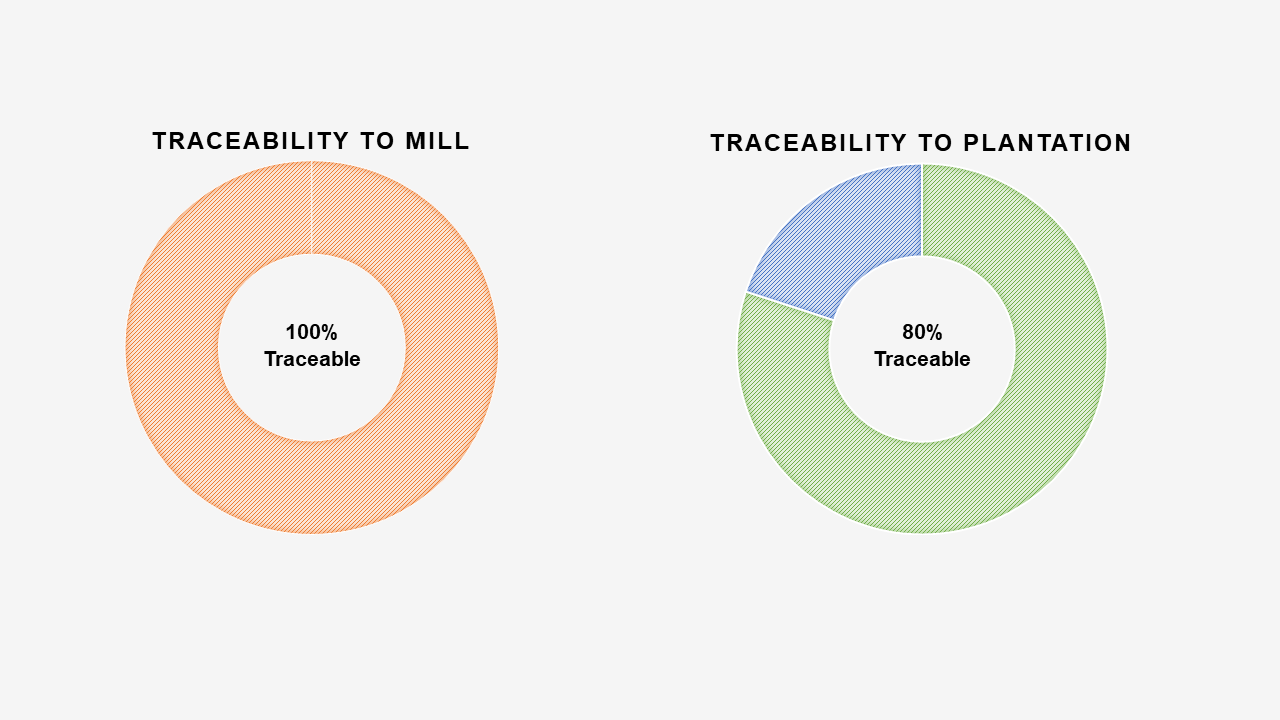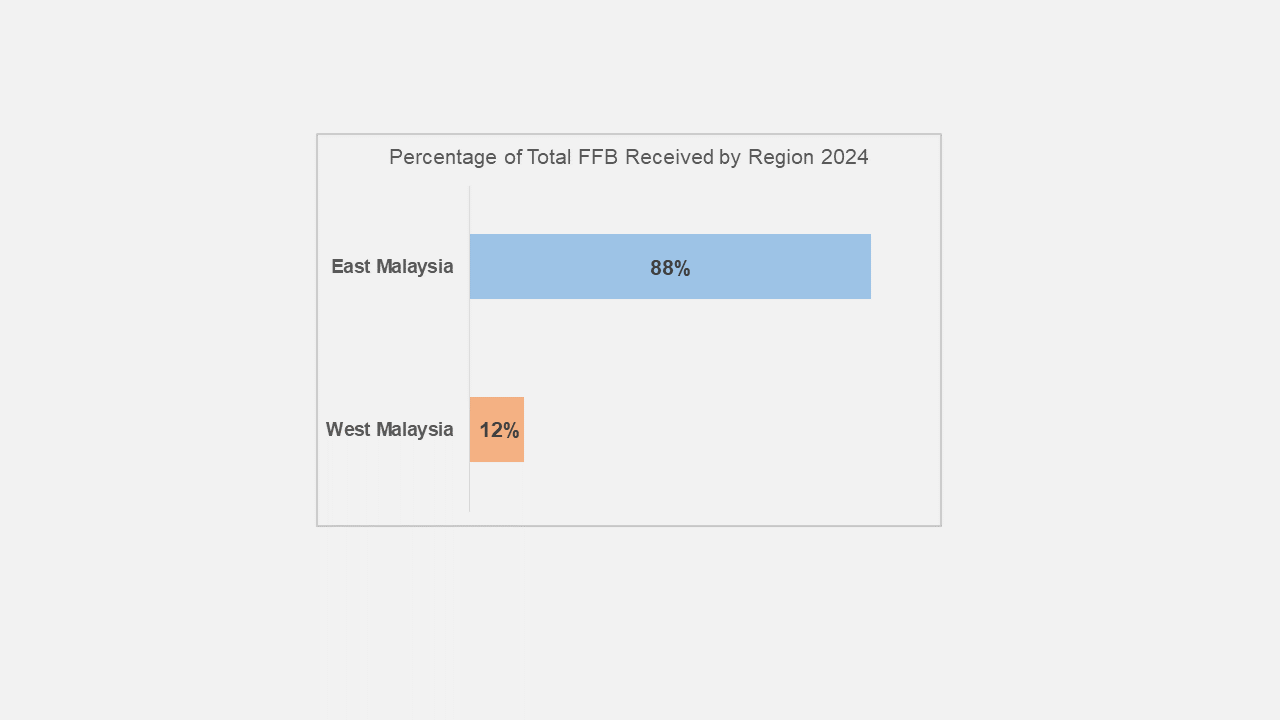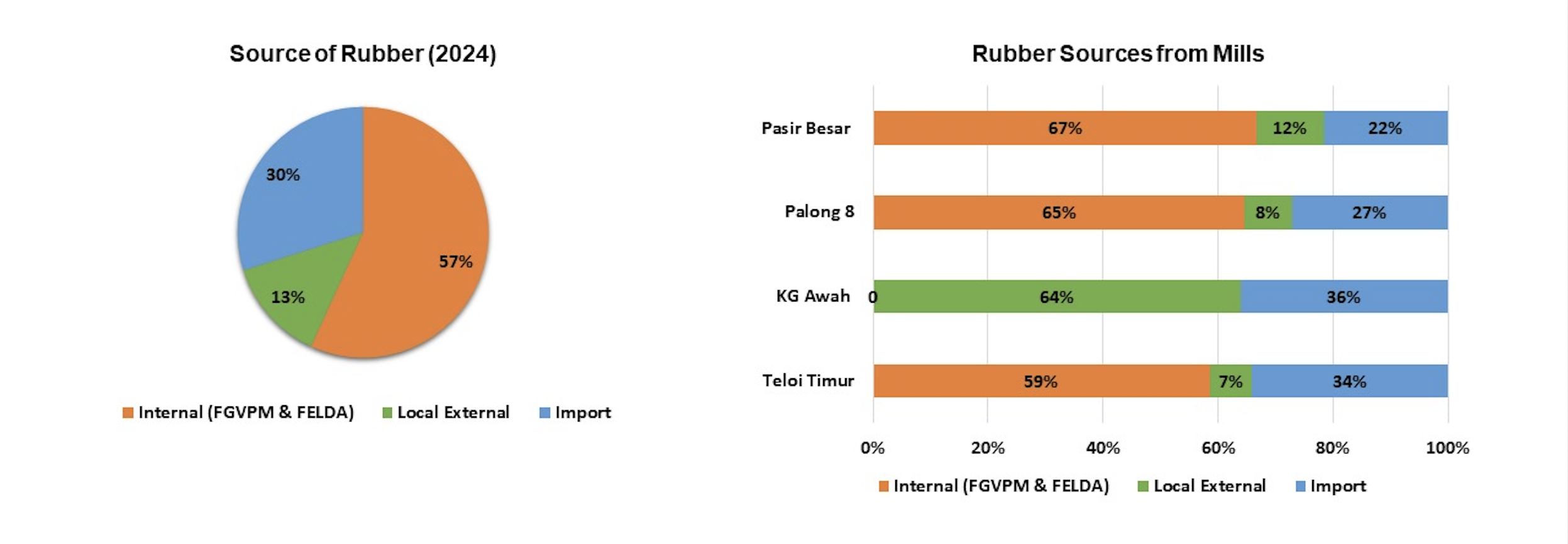Traceability is an essential element of our business and is instrumental in fulfilling our commitment to responsible sourcing. We are committed to continuously improving the traceability of sourced raw materials and actively monitoring compliance with applicable sustainability standards throughout its supply chain, as well as ensuring that our products are not linked to any deforestation, planting on peat, and exploitation of human rights, which is in line with FGV’s Group Sustainability Policy (GSP).
Traceability
1. Traceability in Oil Palm
In Malaysia, FGV has a total of six (6) refineries. Four (4) of them are fully managed by FGV subsidiaries; FGV Refineries Sdn Bhd (3), and Delima Oil Products Sdn Bhd (1). The other two (2) refineries are managed by our joint venture.
To ensure our palm products are sourced from responsible sources, we started to trace our raw materials in 2017. Our traceability covers Traceability to Mills (TTM) and Traceability to Plantations (TTP).
1.1 Traceability to Mills (TTM)
We consider mills traceable when details such as their name, parent company’s name, address /GPS coordinate, and volume supplied are known. Our TTM has been at 100% since 2019 for all our midstream and downstream facilities which include FGV Refineries Sdn Bhd, FGV Kernel Products Sdn. Bhd., FGV Biotechnologies Sdn Bhd, Delima Oil Products Sdn Bhd as well as our JVs in Malaysia. These facilities also processed 100% of MSPO-certified and 45% of RSPO-certified CPO. More than 90% of the CPO processed by our refineries and biodiesel (FGV Refineries Sdn Bhd, Delima Oil Products Sdn Bhd & FGV Biotechnologies Sdn Bhd) is from our own internal sources. In 2024, we only sourced from seven (7) third-party mills that contribute less than 3.90% (25,409.90 MT) of our total CPO processed by these refineries. As for our JV’s in Malaysia, FGV IFFCO Sdn Bhd, the traceability information can be view at here.
1.2 Traceability to Plantations (TTP)
Due to the complexity of the FFB supply chain that involves multiple categories of players/levels, our requirement for TTP varies between supplier categories. The suppliers are considered traceable to the plantation when details as follows are available:
| Element/Information | Third-party Estate | Smallholders* | Dealer/Cooperative/Collection centres** |
| Supplier name*** | √ | √ | √ |
| Company name**** | √ | NA | √ |
| GPS Location of supplier | √ | √ (location of village/sub district is sufficient) |
√ |
| Size of land | √ | √ | X |
| Volume supplying to mill | √ | √ | √ |
NA: Not Applicable
*This requirement is for independent smallholders supplying to FGV mills. Information for scheme/plasma smallholders are available at https://felda.gov.my/peneroka/lokasi-rancangan.
**For Dealer/Cooperative/Collection Centres receiving FFB from estates, full information of the estates as mentioned in the table above (Third-party estate) is required. If the sources are from smallholders, name of the smallholders and quantity supplied are sufficient.
***Supplier defines as an entity with legal authority to supply palm oil materials to any FGV facility.
****Company name – The name of the holding company or producer have a legal authority to sell palm oil materials.
Of all the 63 palm oil mills operated by FGV, only four (2) mills sourced 100% of FFB from our own plantation. The remaining 61 palm oil mills received a mixture of FFB from internal and external sources.
By the end of 2024, we achieved 80% TTP following a revision of our traceability definition. Previously, traceability was considered fulfilled when geolocation and volume data from dealers/collection centre were available. Under the revised definition, full TTP now requires identification of the exact plantation locations of all external suppliers. This enhancement was implemented primarily to align with the requirements of the EU Deforestation Regulation (EUDR).
FGV remains committed to strengthening traceability practices and supporting our suppliers through continuous engagement to ensure responsible sourcing and supply chain transparency.
Breakdown of Volume and percentage for External (ISH, Dealers, Estates & Others)
Upstream



Traceable to mill |
Traceable to plantation |
Crude Palm Oil
Palm Kernel Oil
Upstream
Crude Palm Oil
Palm Oil Mill
Palm Kernel Oil
Palm Oil Mill
Downstream
Crude Palm Oil
FGVR & DOP
Traceability In The Operational Units
Refineries – CPO (4 plants)
| Traceability to Mill | Traceability to Plantation |
Percentage of Internal CPO | |
| Kuantan Oil Products | 100% | 68% | 95% |
| Sahabat Oil Products | 100% | 84% | 100% |
| Tawau Oil Products | 100% | 48% | 73% |
| Delima Oil Products | 100% | 80% | 100% |
FGVBSB
Traceability In The Operational Units
Biodiesel (FGVBSB – 1 plant)
| Traceability to Mill | Traceability to Plantation | Percentage of Internal CPO | |
| FGV Biotech | 100% | 68% | 100% |
Total Downstream
Palm Kernel Oil
FGVR
Traceability In The Operational Units
Refinery – PKO (FGVR – 1 plant)
| Traceability to Mill | Traceability to Plantation | Percentage of Internal PKO | |
| Kuantan Oil Products | 100% | 72% | 12.4% |
FGVKP
Traceability In The Operational Units
Kernel Crushing Plant (FKP – 4 plants)
| Traceability to Mill | Traceability to Plantation | Percentage of Internal PK | |
| Semambu | 100% | 72% | 100% |
| Pasir Gudang | 100% | 86% | 100% |
| Pandamaran | 100% | 66% | 100% |
| Sahabat | 100% | 84% | 100% |
Total Downstream
| FGVR : FGV Refineries Sdn Bhd | FGVBSB : FGV Biotechnologies Sdn Bhd | DOP : Delima Oil Products Sdn Bhd |
| FGVKP : FGV Kernel Products Sdn Bhd | FGVPM : FGV Plantations (Malaysia) Sdn Bhd |
Traceability in Rubber
Aside from focusing on palm oil, FGV is equally committed to ensuring that all of our products including rubber, are sustainably produced and traceable. In 2024, 57% of our rubber supply came from internal sources, specifically FGV Plantations Malaysia (FGVPM) and FELDA, demonstrating our commitment to leveraging our own sustainable resources. Additionally, 13% of our rubber was sourced from local externals, and 30% was imported, ensuring a diverse and resilient supply chain.
As of December 2024, we have achieved 100% traceability to plantation for all internal sources and 81% traceability for local supplies (including both internal and external sources). The traceability percentage reflects the increasing complexity of data requirements and the introduction of enhanced criteria aimed at aligning our rubber supply chain with evolving market and regulatory expectations.
Moving forward, we will continue to strengthen our sourcing practices through innovation, engagement, and collaboration. FGV remains committed to continuously enhancing sustainability efforts, ensuring operations support the well-being of our planet and communities while consistently delivering high-quality products to our customers.
Rubber Traceability Dashboard (January 2024 - December 2024)

Smallholder Inclusion
Smallholders play a vital role in the palm oil supply chain and contribute significantly to rural development. FGV supports these smallholders who depend on palm oil as their primary source of income, by promoting fair market access, strengthening rural livelihoods, and encouraging sustainable agricultural practices.

Through our Group Sustainability Policy (GSP), we work to improve smallholder livelihoods, support sustainable agricultural practices, and ensure fair inclusion in the palm oil supply chain. To maintain sustainability standards, we monitor compliance and conduct regular reviews to identify and address any gaps. These efforts strengthen smallholder resilience, foster sustainable development, and connect them to premium markets.
